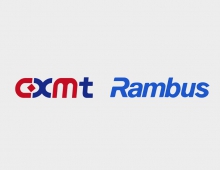
Rambus Wins Pretrial Patent Ruling Against Chipmakers
Rambus won a pretrial ruling that chipmakers infringed one claim, or element, of a patent in a case scheduled for trial in January.
The U.S. District Judge in San Jose, California, ruled
yesterday that chipmakers including Suwon, Samsung
infringed an element of a Rambus patent covering computer
memory. The other companies are Ichon, Hynix Semiconductor
Micron Technology and Nanya Technology.
The judge denied Rambus?s request for similar pretrial rulings covering 10 other elements of its patents. Those claims will be argued at the trial covering infringement claims over DDR2 and DDR3, as well as graphics memory.
The trial against the manufacturers, set for Jan. 19, follows Rambus?s victory in a patent-infringement lawsuit this year against Hynix over earlier generations of memory. Rambus is waiting for a ruling on its request to block Hynix from selling its DRAM chips in the U.S.
Besides banning Hynix sales, the judge can order the company to buy a license from Rambus at a rate he sets or force the parties to agree to one.
Rambus also today announced that the Federal Trade Commission (FTC) has filed a petition for a writ of certiorari in the United States Supreme Court, seeking to overturn a decision by the U.S. Court of Appeals for the District of Columbia Circuit (CADC) in Rambus' favor.
The CADC expressed "serious concerns" about the evidence on which the Commission relied for a number of its findings and held in particular that conduct by Rambus at a standards setting organization known as JEDEC did not injure competition.
"We are not surprised by the FTC's filing and we are hopeful that the Supreme Court will confirm the decision of the CADC," said Tom Lavelle, senior vice president and general counsel at Rambus. "We will file our response in the near future, and I note that the rulings of the FTC's administrative law judge, the CADC and a federal court jury in March of this year confirm that our position is the correct one."
In a decision in April of this year, the CADC determined the FTC failed to demonstrate that Rambus harmed competition. In March of this year, a Federal District Court jury found that Rambus did not engage in anticompetitive conduct and did not commit fraud, mislead or make misrepresentations to JEDEC.
The FTC brought antitrust charges against Rambus in 2002. A three-month trial was held in the spring of 2003 before Chief Administrative Law Judge Stephen McGuire, who issued his initial decision exonerating Rambus with over 1,600 findings of fact in its favor in early 2004. The FTC's own Complaint Counsel appealed the decision of the fact-finder to the full Commission, which reversed the ALJ and found Rambus liable for violating Section 2 of the Sherman Act.
The judge denied Rambus?s request for similar pretrial rulings covering 10 other elements of its patents. Those claims will be argued at the trial covering infringement claims over DDR2 and DDR3, as well as graphics memory.
The trial against the manufacturers, set for Jan. 19, follows Rambus?s victory in a patent-infringement lawsuit this year against Hynix over earlier generations of memory. Rambus is waiting for a ruling on its request to block Hynix from selling its DRAM chips in the U.S.
Besides banning Hynix sales, the judge can order the company to buy a license from Rambus at a rate he sets or force the parties to agree to one.
Rambus also today announced that the Federal Trade Commission (FTC) has filed a petition for a writ of certiorari in the United States Supreme Court, seeking to overturn a decision by the U.S. Court of Appeals for the District of Columbia Circuit (CADC) in Rambus' favor.
The CADC expressed "serious concerns" about the evidence on which the Commission relied for a number of its findings and held in particular that conduct by Rambus at a standards setting organization known as JEDEC did not injure competition.
"We are not surprised by the FTC's filing and we are hopeful that the Supreme Court will confirm the decision of the CADC," said Tom Lavelle, senior vice president and general counsel at Rambus. "We will file our response in the near future, and I note that the rulings of the FTC's administrative law judge, the CADC and a federal court jury in March of this year confirm that our position is the correct one."
In a decision in April of this year, the CADC determined the FTC failed to demonstrate that Rambus harmed competition. In March of this year, a Federal District Court jury found that Rambus did not engage in anticompetitive conduct and did not commit fraud, mislead or make misrepresentations to JEDEC.
The FTC brought antitrust charges against Rambus in 2002. A three-month trial was held in the spring of 2003 before Chief Administrative Law Judge Stephen McGuire, who issued his initial decision exonerating Rambus with over 1,600 findings of fact in its favor in early 2004. The FTC's own Complaint Counsel appealed the decision of the fact-finder to the full Commission, which reversed the ALJ and found Rambus liable for violating Section 2 of the Sherman Act.




















